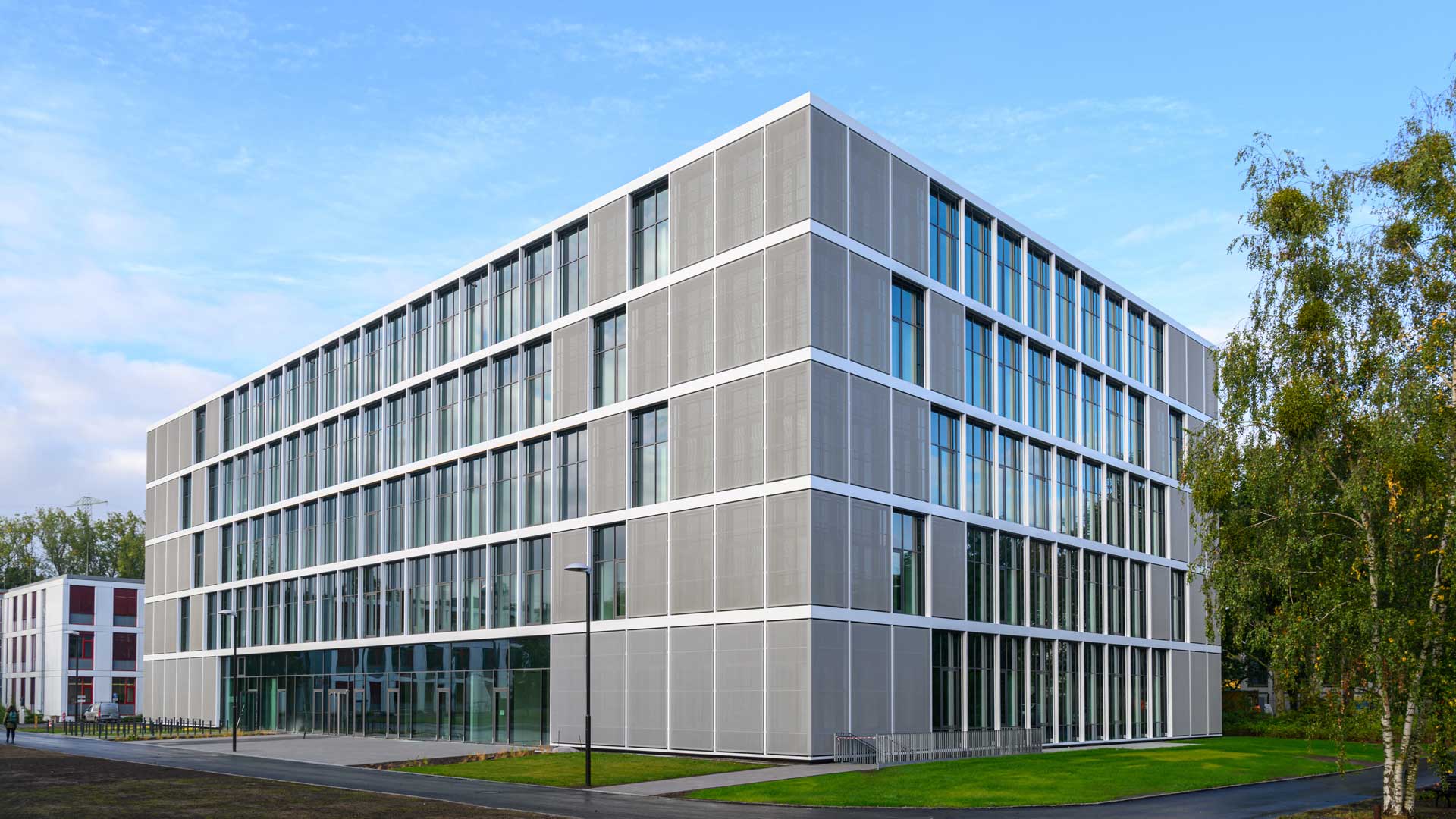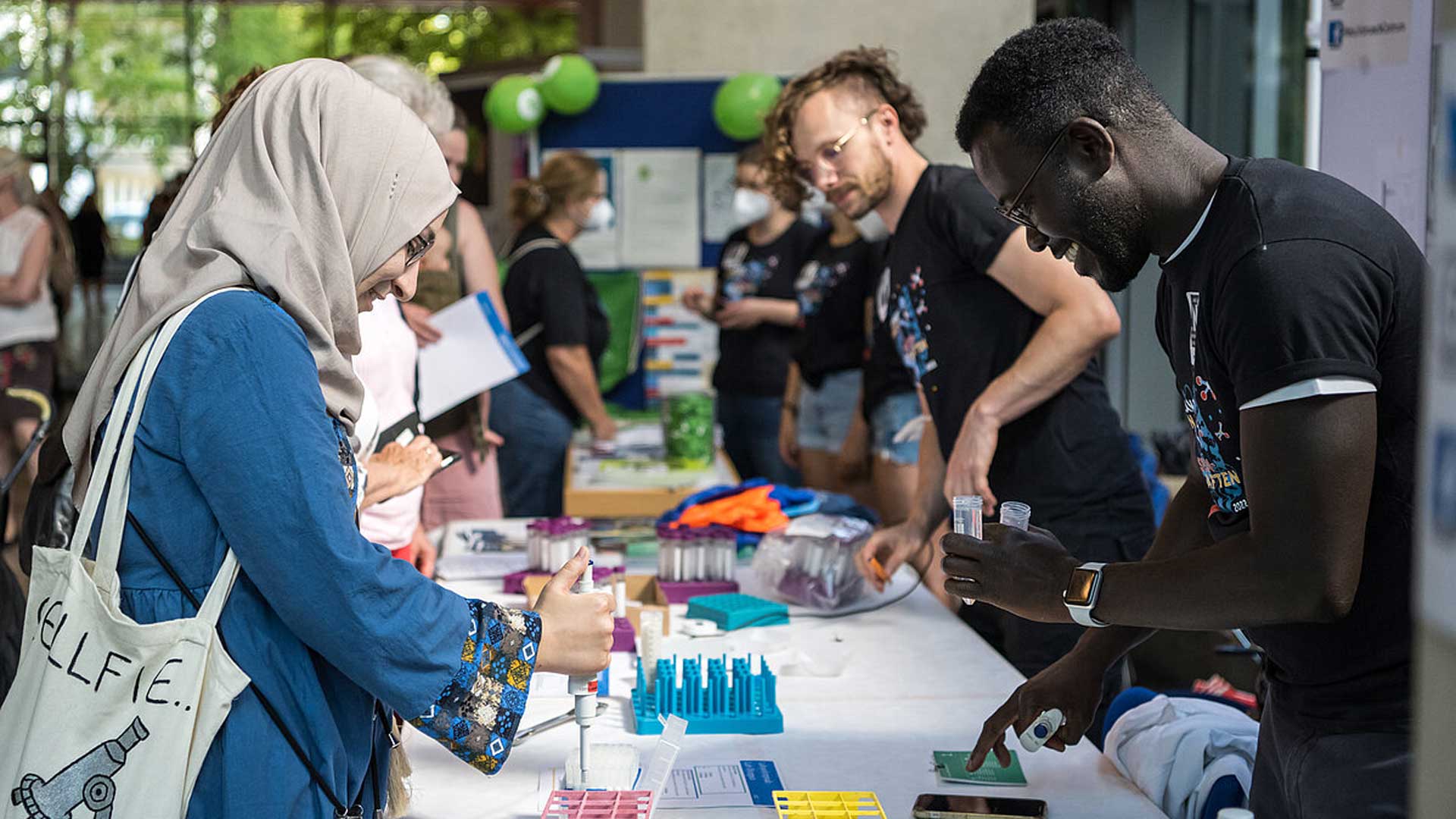Scientific collaborations – Berlin’s open research atmosphere
The variety of partners, networks and cooperation opportunities in Brain City Berlin is unparalleled anywhere in the world. The close, interdisciplinary cooperation between the various institutions typical of Berlin leads to future-oriented solutions. Berlin’s universities, technical colleges, private colleges and non-university research institutions are also in close contact with the Berlin technology parks and the many research-related companies in the capital.
"The funding of five Clusters of Excellence demonstrates: The capital stands for internationally visible, outstanding research."
Berlin University Alliance - Berlin universities are joining forces
The Berlin University Alliance (BUA) is a university alliance for innovative research and teaching. In July 2019, the Alliance of the Freie Universität Berölin,Techische Universität zu Berlin and Humboldt-Universität zu Berlin with Charité - Universitätsmedizin Berlin was awarded the title of Excellence University by the Federal and State governments as part of the Excellence Strategy (ExStra). The alliance receives permanent funding of 15 to 28 million Euro per year.
The overall goal of the Berlin University Alliance is to create a joint, integrated research space in the Brain City Berlin. As a driving force, the alliance wants to develop the top international level of the science location further.
Berlin Research 50 - Alliance of non-university institutions
In February 2020, the non-university research institutions and centres of the Brain City Berlin merged. The BR 50 (Berlin Research 50) initiative aims to develop strategies for research and to have exchanges both with politics and society in the future. Another goal of the alliance: to facilitate coordination between the non-university research institutions.
Members of the alliance come from all scientific fields. They include institutes of the major scientific organisations Leibniz Association, Max Planck Society, Helmholtz Association and Fraunhofer Society as well as the Federal departmental research institutes and the Prussian Cultural Heritage Foundation.
IFAF Berlin - Strengthening research at Universities of Applied Sciences
The Institute for Applied Research Berlin (IFAF Berlin) pools the research expertise of the four State-run Berlin Universities of Applied Sciences: ASH Berlin, Berliner Hochschule für Technik (BHT), HTW Berlin – University of Apllied Sciences and the Hochschule für Wirtschaft und Recht Berlin (HWR Berlin).
With the support of the State of Berlin, IFAF Berlin promotes cross-university knowledge and technology transfer as well as projects for integration, digital cultural transformation and start-up financing. Scientists work in a practical way with non-profit organisations and medium-sized companies.
As SAGE universities, we are united by topics such as: social and global justice, gender equality, the promotion of diversity, anti-discrimination and anti-racism, inclusion, social engagement, sustainability in the sense of education for sustainable development, climate justice, social security, and good living conditions for all.
SAGE Network – Greater Visibility for Social Sector Studies
The acronym SAGE stands for Social Work, Health, Education, and Pedagogy.
In 2019, Alice Salomon University of Applied Sciences Berlin (ASH Berlin), the Protestant University of Applied Sciences Berlin (EHB), and the Catholic University of Applied Sciences Berlin (KHSB) formed this three-member alliance.Through the SAGE network, the universities aim to strengthen their collaboration and increase the visibility of higher education in the social sector. The three participating institutions offer academic programs and continuing education that qualify students for careers in the SAGE fields.
ECDF - joint research and groundbreaking alliances
The Einstein Centre Digital Future (ECDF) is funded by the Einstein Foundation Berlin. The declared objective of the foundation is to “promote science and research in Berlin”. The ECDF sees itself as an inter-university nucleus dedicated to the digitisation of society. It combines innovation with interdisciplinarity and connects scientists from different disciplines to research one of the most important topics of our time.
Berlin-Brandenburg Academy of Sciences and Humanities – Promote exchange
The BBAW (Berlin-Brandenburg Academy of Sciences and Humanities) is a cross-disciplinary and cross-regional association of outstanding scholars with a tradition spanning over 300 years.
Its history has been shaped by 80 Nobel Prize laureates.
The BBAW’s mission is to promote science and the dialogue between science and society, as well as to support institutional collaboration between non-university research institutions and universities in Berlin and Brandenburg.

Research transfer – a major asset of the science region
Brain City Berlin is a hotspot for knowledge-based spin-offs. High-calibre networks and institutions specifically promote transfer between research and science. It is no coincidence that Berlin is Germany's start-up capital, with around 500 new start-ups per year. Many of these young companies are deep tech spin-offs from science.
Start-up centres such as the Chemical Invention Factory at TU Berlin, the BerlinBioCube on the Berlin-Buch campus, and the Food Campus Berlin currently being built in Berlin-Tempelhof are specifically geared towards this.
- Berlin Institute of Health (BIH): The mission of the BIH at Charité – Universitätsmedizin Berlin is medical translation. It promotes the translation of scientific findings into applications, products and services for the benefit of patients.
- UNITE Berlin: More than 50 partners from the fields of science, business, politics and society in Berlin and Brandenburg have joined forces for the central innovation and start-up centre of the capital region, which was launched in 2024. The aim of the public-private partnership is to further develop the capital region into a leading international innovation ecosystem. UNITE will receive ten million euros in funding from the federal government until 2030 as part of the EXIST flagship competition ‘Startup Factories’. A further 20 million euros will be provided by the Senate Administrations for Science, Health and Care and for Economics, Energy and Public Enterprises, as well as private donors.
- Innovate! lab: With the ‘innovate! lab’, the Berlin University Alliance aims to strengthen the transfer of cutting-edge research from the BUA network into practice from 2025 onwards. It is intended to promote the transfer of excellent research results into concrete sustainable materials and technologies. In addition, the success factors of this approach will be examined through accompanying scientific research. The initial focus is on transferring excellent research results from chemistry in order to advance the development of sustainable materials and technologies. The success factors of this approach will be scientifically monitored. The Joachim Herz Foundation in Hamburg is funding the establishment of the lab over a maximum period of four years with a total of up to 5 million euros.
- K. I. E. Z. The Artificial Intelligence Entrepreneurship Centre (K.I.E.Z.) promotes the establishment of science-related companies in the field of artificial intelligence. It is supported by Science & Startups, the association of start-up centres at Berlin's universities – Freie Universität Berlin, Technische Universität Berlin and Humboldt-Universität zu Berlin – in cooperation with Charité – Universitätsmedizin Berlin. As one of four EXIST model projects nationwide for more start-ups in the field of AI, K.I.E.Z. is funded by the Federal Ministry for Economic Affairs and Energy (BMWE) and co-financed by the State of Berlin. In 2024 K.I.E.Z. merged with AI+Munich into the national platform AI Nation.
- BERLIN QUANTUM: This joint initiative by Berlin's business community, research institutions and universities aims to make Berlin an international hotspot for research and development in quantum technologies. The vision of BERLIN QUANTUM is to advance excellent research, promote the transfer of quantum technologies to a wide range of application fields, and exploit the associated potential for businesses and the economy.
- AMBER: AMBER stands for ‘Additive Manufacturing Berlin-Brandenburg’. As an umbrella brand, the cluster brings together leading research institutions, innovative companies, start-ups and political actors. The central initiative for the expansion and networking of additive manufacturing in the capital region is open to anyone who works in additive manufacturing in Berlin, develops it or is interested in it. AMBER's objective is to translate research results more quickly into marketable, sustainable products and applications and to develop Berlin-Brandenburg into the 3D printing capital of Europe by 2030. AMBER is funded by the Senate Department for Economics, Energy and Public Enterprises. Berlin Partner for Business and Technology coordinates the cluster.

Science Festivals
The exchange between science and society holds a high priority in Brain City Berlin. This is reflected in many exciting events that also incorporate citizen science approaches such as those at the Museum für Naturkunde Berlin or the Futurium. Here are the three largest annual events:
-
LNDW: Each year, the Long Night of the Sciences offers fascinating insights into the many disciplines of Berlin’s scientific landscape. In 2025, more than 50 scientific institutions opened their doors to around 36,000 visitors to celebrate the 25th anniversary of the LNDW.
-
Berlin Science Week: Around 300 events take place at two central festival hubs and numerous locations across the city. As one of Europe’s leading science festivals, Berlin Science Week transforms the city into a vibrant place of ideas every November. Science and society come together to explore how research shapes our world. In 2025, Berlin Science Week will be held for the tenth time!
-
Falling Walls Summit: Building bridges and breaking down walls: Every year from November 6 to 9, the Falling Walls Foundation brings renowned experts to Berlin and fosters interdisciplinary dialogue on innovation, research, and society. A special highlight: the recognition of the “Science Breakthroughs of the Year.”
Berlin has a high concentration of bright minds and unique places where people are creative together and think beyond their own horizons.
Zukunftsorte - the Berlin future locations
At Berlin’s “Zukunftsorte” (places of future innovation), science and industry pool their potential to create groundbreaking developments across various fields. The newest Zukunftsorte in Berlin are the Siemensstadt Square area and the Berlin TXL – Urban Tech Republic, located on the site of the former Tegel Airport.
Berlin supports a total of eleven Zukunftsorte. These are defined in the coalition agreement of the State of Berlin.
- Adlershof
- Berlin Buch
- Berlin Campus Charlottenburg
- Berlin SÜDWEST
- Berlin TXL – The Urban Tech Republic
- CleanTech Marzahn
- EUREF-Campus Berlin
- Flughafen Tempelhof
- Siemensstadt Square
- Technologie-Park Berlin-Humboldthain
- Wirtschafts- und Wissenschaftsstandort Berlin Schöneweide